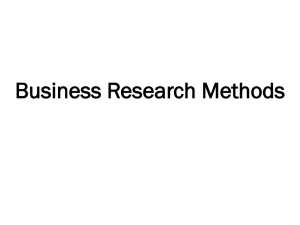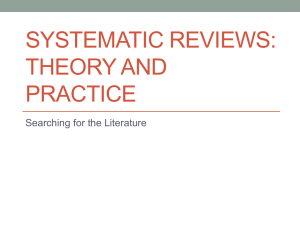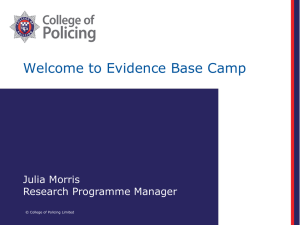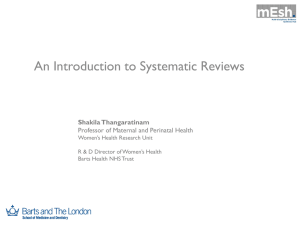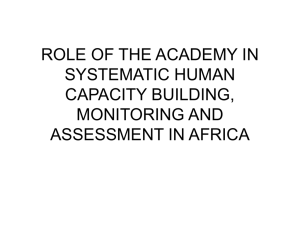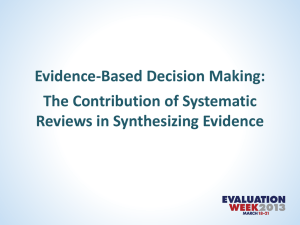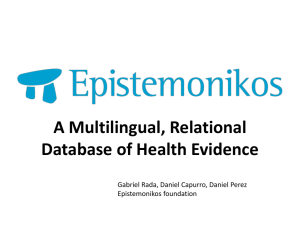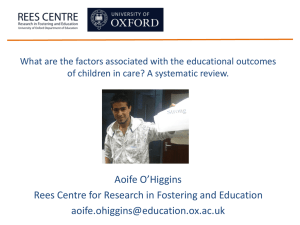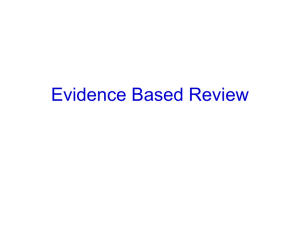Why is Adding Value in Research important to the NIHR
advertisement
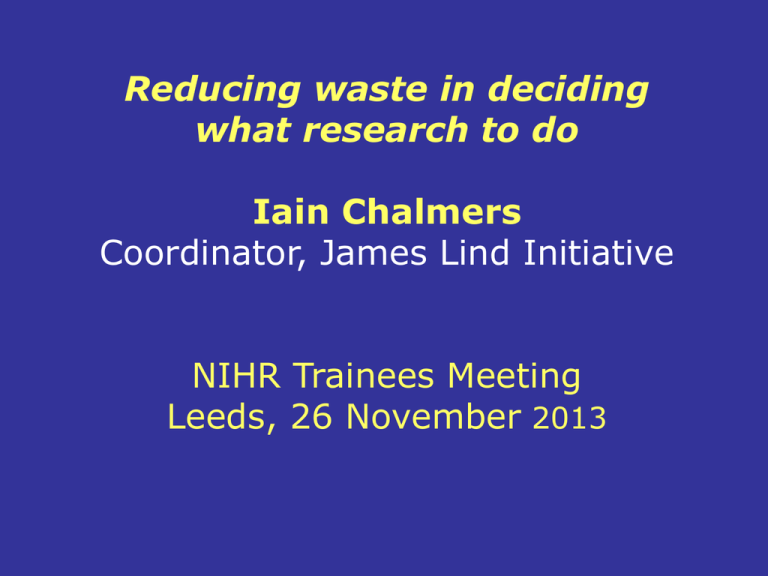
Reducing waste in deciding what research to do Iain Chalmers Coordinator, James Lind Initiative NIHR Trainees Meeting Leeds, 26 November 2013 Questions relevant to clinicians & patients? Low priority questions addressed Important outcomes not assessed Clinicians and patients not involved in setting research agendas Appropriate design and methods? Accessible full publication? Unbiased and usable report? Over 50% studies designed without reference to systematic reviews of existing evidence Over 50% of studies never published in full Over 30% of trial interventions not sufficiently described Biased underreporting of studies with disappointing results Over 50% of planned study outcomes not reported Over 50% of studies fail to take adequate steps to reduce biases, e.g. unconcealed treatment allocation 50 % Most new research not interpreted in the context of systematic assessment of other relevant evidence 50 % 85% Research waste = over $85 Billion / year 50 % Avoidable waste in producing and reporting research evidence. Lancet series, 8 Jan 2014 Questions relevant to users of research? Appropriate research design, conduct and analysis? Low priority questions addressed Over 50% of studies fail to take adequate steps to reduce biases Important outcomes not assessed Over 50% studies designed without reference to systematic reviews of existing evidence Studies with inadequate statistical power Inadequate replication of initial observations Efficient research regulation and delivery? Hyper-regulation of research Inefficient delivery of research Poor re-use of data Failure to promote evaluative research as an integral element of good clinical practice Research waste Accessible, full research reports? Over 50% of studies never published in full Biased underreporting of studies with disappointing results Biased reporting of data within studies Unbiased and usable reports? Over 30% of trial interventions not sufficiently described Over 50% of planned study outcomes not reported Most new research not interpreted in the context of systematic assessment of other relevant evidence Avoidable waste in deciding what research to do. Paper 1, Lancet series, 2014 Questions relevant to users of research? Appropriate research design, conduct and analysis? Low priority questions addressed Over 50% of studies fail to take adequate steps to reduce biases Important outcomes not assessed Over 50% studies designed without reference to systematic reviews of existing evidence Studies with inadequate statistical power Inadequate replication of initial observations Efficient research regulation and delivery? Hyper-regulation of research Inefficient delivery of research Poor re-use of data Failure to promote evaluative research as an integral element of good clinical practice Research waste Accessible, full research reports? Over 50% of studies never published in full Biased underreporting of studies with disappointing results Biased reporting of data within studies Unbiased and usable reports? Over 30% of trial interventions not sufficiently described Over 50% of planned study outcomes not reported Most new research not interpreted in the context of systematic assessment of other relevant evidence Iain Chalmers, James Lind Initiative, Oxford, UK Michael B Bracken, Schools of Public Health and Medicine, Yale University, New Haven, USA Ben Djulbegovic, Moffitt Cancer Centre & Research Institute, University of South Florida, USA Silvio Garattini, Mario Negri Pharmacological Research Institute, Milan, Italy Jonathan Grant, RAND Europe, Cambridge, UK Metin Gulmezoglu, WHO, Geneva, Switzerland David Howells, National Stroke Research Institute, Melbourne, Australia John PA Ioannidis, School of Medicine and Department of Statistics, Stanford University, USA Sandy Oliver, Institute of Education, London, UK 1 Waste resulting from ignoring the needs of potential users of research 2 Waste resulting from ignoring what is already known or already being researched 1 Waste resulting from ignoring the needs of potential users of research Avoidable waste in deciding what research to do. Paper 1, Lancet series, 2014 Questions relevant to users of research? Appropriate research design, conduct and analysis? Low priority questions addressed Over 50% of studies fail to take adequate steps to reduce biases Important outcomes not assessed Over 50% studies designed without reference to systematic reviews of existing evidence Studies with inadequate statistical power Inadequate replication of initial observations Efficient research regulation and delivery? Hyper-regulation of research Inefficient delivery of research Poor re-use of data Failure to promote evaluative research as an integral element of good clinical practice Research waste Accessible, full research reports? Over 50% of studies never published in full Biased underreporting of studies with disappointing results Biased reporting of data within studies Unbiased and usable reports? Over 30% of trial interventions not sufficiently described Over 50% of planned study outcomes not reported Most new research not interpreted in the context of systematic assessment of other relevant evidence Low priority questions addressed in research on treatments for osteoarthritis of the knee Tallon, Chard and Dieppe. Lancet, 2000. The UK Database of Uncertainties about the Effects of Treatments To publish uncertainties about the effects of treatments which cannot currently be answered by referring to relevant and reliable, up-to-date systematic reviews of existing research evidence To promote Priority Setting Partnerships involving patients and clinicians to identify and promote their shared priorities for therapeutic research 100% 20 89 90% 307 Education and training, service delivery, psychological, physical, exercise, complementary, diet, other 80% 70% 74 60% 332 50% 689 40% 30% 29 20% 10% Radiotherapy, surgery and perioperative, devices, and diagnostic Drugs, vaccines and biologicals 397 23 0% JLA patient-clinician Priority Setting Partnerships Registered noncommercial trials Registered commercial trials Interventions mentioned in research priorities identified by James Lind Alliance patient-clinician Priority Setting Partnerships, and among registered trials, 2003-2012. (Chalmers et al. 2013) Important outcomes not assessed Priority treatment outcome from a survey of patients with rheumatoid arthritis was not pain It was fatigue Alessandro Liberati "Studies that involved patients to a greater extent were more likely to have achieved recruitment targets (χ2 = 4.58, P<0.05), defined as reaching at least 90% of the target.“ Ennis L, Wyke T. Impact of patient involvement in mental health research: longitudinal study. Br J Psychiatr Published online ahead of print 12 Sept 2013. doi: 10.1192/bjp.bp.112.119818. 2 Waste resulting from ignoring what is already known or already being researched Avoidable waste in deciding what research to do, Lancet series, 2013 Questions relevant to users of research? Appropriate research design, conduct and analysis? Low priority questions addressed Over 50% of studies fail to take adequate steps to reduce biases Important outcomes not assessed Over 50% studies designed without reference to systematic reviews of existing evidence Studies with inadequate statistical power Inadequate replication of initial observations Efficient research regulation and delivery? Hyper-regulation of research Inefficient delivery of research Poor re-use of data Failure to promote evaluative research as an integral element of good clinical practice Research waste Accessible, full research reports? Over 50% of studies never published in full Biased underreporting of studies with disappointing results Biased reporting of data within studies Unbiased and usable reports? Over 30% of trial interventions not sufficiently described Over 50% of planned study outcomes not reported Most new research not interpreted in the context of systematic assessment of other relevant evidence "It is essential that existing sources of evidence, especially systematic reviews, are considered carefully prior to undertaking research… Research which duplicates other work unnecessarily, or which is not of sufficient quality to contribute something useful to existing knowledge, is in itself unethical." Department of Health 2001 Waste resulting from studies designed without reference to systematic reviews of existing evidence, published and unpublished, and ongoing studies STUDIES IN ANIMALS 20 animal studies: “The results of this review did not show convincing evidence to substantiate the decision to perform trials with nimodipine in large numbers of patients. Stroke 2001;32:2433-8. STUDIES IN HUMANS Horn J, Limburg M. Calcium antagonists for acute ischemic stroke. The Cochrane Database of Systematic Reviews, 2000 “46 trials were identified of which 28 were included (7521 patients). No effect of calcium antagonists on poor outcome at the end of followup (OR 1.07, 95% CI 0.97/1.18), or on death at end of follow-up (OR 1.10, 95% CI 0.98/1.24) was found.” Proportion (%) of clinical trials registered by 1999 and published by 2007 (from Ross et al. PLoS Med 2009;6(9): e1000144). Country Size Phase Funder UK HTA program Sense about Science’s campaign: All trials registered; all trials published If you haven’t already done so, add your support at www.alltrials.net Retrospective cumulative meta-analyses demonstrate waste In use-inspired basic research Sena et al. 2010 In pure applied research Cumulative meta-analysis showing effect of antenatal corticosteroids on risk of neonatal death (Sinclair 1995) The Cochrane Collaboration Avoidable waste in deciding what research to do, Lancet series, 2013 Questions relevant to users of research? Appropriate research design, conduct and analysis? Low priority questions addressed Over 50% of studies fail to take adequate steps to reduce biases Important outcomes not assessed Over 50% studies designed without reference to systematic reviews of existing evidence Studies with inadequate statistical power Inadequate replication of initial observations Efficient research regulation and delivery? Hyper-regulation of research Inefficient delivery of research Poor re-use of data Failure to promote evaluative research as an integral element of good clinical practice Research waste Accessible, full research reports? Over 50% of studies never published in full Biased underreporting of studies with disappointing results Biased reporting of data within studies Unbiased and usable reports? Over 30% of trial interventions not sufficiently described Over 50% of planned study outcomes not reported Most new research not interpreted in the context of systematic assessment of other relevant evidence An example of dividends from well designed pure applied research Ian Roberts and his colleagues did the CRASH trial to address uncertainty about the effects of giving systemic steroids for people with acute traumatic brain injury, a treatment that had been in use for over three decades. A systematic review of existing knowledge Alderson P, Roberts I (1997). BMJ 314:1855-9; and Cochrane Database of Systematic Reviews. The review revealed important uncertainty about whether systemic steroids did more good than harm. Addressing an important uncertainty Because the systematic review and a survey of clinical practice had revealed important uncertainty, a large, publicly-funded, multicentre randomized trial was organised; the trial was registered prospectively; the protocol for the trial was published Lancet 2004;364:1321-28 • The report of the CRASH trial is exemplary because: • it refers to current uncertainty about the effects of a treatment, shown in a systematic review of all the existing evidence, and in variations in clinical practice • it notes that the trial was registered and the protocol published prospectively • it sets the new results in the context of an updated systematic review of all of the existing evidence • it provides readers with all the evidence needed for action to prevent thousands of iatrogenic deaths Patients have suffered and died unnecessarily because of: ● failure to address important uncertainties about the effects of treatments ● biased under-reporting of research ● failure to review existing evidence systematically when planning new research Alessandro Liberati
